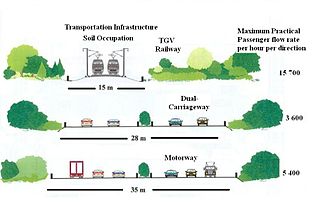
Sustainable urban infrastructure expands on the concept of urban infrastructure by adding the sustainability element with the expectation of improved and more resilient urban development. In the construction and physical and organizational structures that enable cities to function, sustainability also aims to meet the needs of the present generation without compromising the capabilities of the future generations.
The Deutsche Gesellschaft für Internationale Zusammenarbeit (GIZ) GmbH, often shortened to simply GIZ, is the main German development agency headquartered in Bonn and Eschborn that provides services in the field of international development cooperation and international education work. It is the organization's self-declared goal to deliver effective solutions that offer people better prospects and sustainably improve their living conditions.
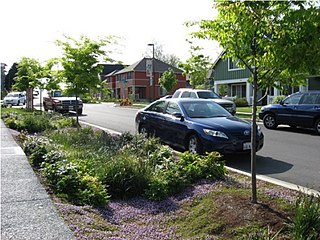
Green infrastructure or blue-green infrastructure refers to a network that provides the “ingredients” for solving urban and climatic challenges by building with nature. The main components of this approach include stormwater management, climate adaptation, the reduction of heat stress, increasing biodiversity, food production, better air quality, sustainable energy production, clean water, and healthy soils, as well as more anthropocentric functions, such as increased quality of life through recreation and the provision of shade and shelter in and around towns and cities. Green infrastructure also serves to provide an ecological framework for social, economic, and environmental health of the surroundings. More recently scholars and activists have also called for green infrastructure that promotes social inclusion and equality rather than reinforcing pre-existing structures of unequal access to nature-based services.
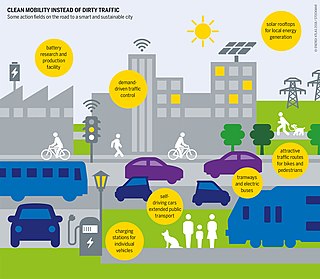
A smart city is a technologically modern urban area that uses different types of electronic methods, voice activation methods and sensors to collect specific data. Information gained from that data is used to manage assets, resources and services efficiently; in return, that data is used to improve operations across the city. This includes data collected from citizens, devices, buildings and assets that is processed and analyzed to monitor and manage traffic and transportation systems, power plants, utilities, water supply networks, waste, crime detection, information systems, schools, libraries, hospitals, and other community services. Smart cities are defined as smart both in the ways in which their governments harness technology as well as in how they monitor, analyze, plan, and govern the city.
The Sustainable Commodity Initiative (SCI) is a joint initiative launched by the International Institute for Sustainable Development (IISD) and the United Nations Conference on Trade and Development (UNCTAD) in 2003. The SCI was formed to facilitate the development and implementation of sustainable commodity production and trade on a global scale by working with the international community. The aim of the initiative is to enhance social, environmental, and economic welfare on a global scale. The initiative works collaboratively with producers and producer organizations, the private sector, government institutions and development focused NGOs. It is also compatible with UNCTAD's Voluntary Sustainability Standards (VSS). The initiative receives project funding from numerous governments worldwide, United Nations agencies, foundations, the private sector, and individual donors.
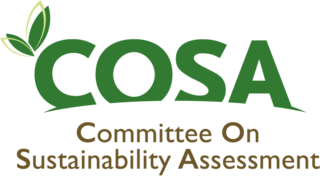
The Committee on Sustainability Assessment (COSA) is a global consortium of development institutions that work collaboratively to advance sustainability learning with its systematic and science-based measurement. COSA applies a pragmatic and collective approach for using scientific methods to develop indicators, tools, and technologies to measure the distinct social, environmental, and economic impacts and are applied in performance monitoring, evaluation, ROI calculation, and impact assessment. COSA has a public mission to open its scientific methods and metrics up to widespread use.
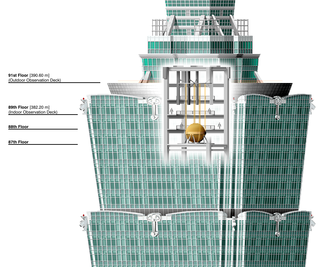
Urban resilience has conventionally been defined as the "measurable ability of any urban system, with its inhabitants, to maintain continuity through all shocks and stresses, while positively adapting and transforming towards sustainability". Therefore, a resilient city is one that assesses, plans and acts to prepare for and respond to hazards - natural and human-made, sudden and slow-onset, expected and unexpected. Resilient Cities are better positioned to protect and enhance people's lives, secure development gains, foster an investible environment, and drive positive change. Academic discussion of urban resilience has focused primarily on three distinct threats; climate change, natural disasters, and terrorism. Resilience to these threats has been discussed in the context of non-physical, as well as, physical aspects of urban planning and design. Accordingly, resilience strategies have tended to be conceived of in terms of counter-terrorism, other disasters, and infrastructure adoption of sustainable energy.

Sustainable urbanism is both the study of cities and the practices to build them (urbanism), that focuses on promoting their long term viability by reducing consumption, waste and harmful impacts on people and place while enhancing the overall well-being of both people and place. Well-being includes the physical, ecological, economic, social, health and equity factors, among others, that comprise cities and their populations. In the context of contemporary urbanism, the term cities refers to several scales of human settlements from towns to cities, metropolises and mega-city regions that includes their peripheries / suburbs / exurbs. Sustainability is a key component to professional practice in urban planning and urban design along with its related disciplines landscape architecture, architecture, and civil and environmental engineering. Green urbanism and ecological urbanism are other common terms that are similar to sustainable urbanism, however they can be construed as focusing more on the natural environment and ecosystems and less on economic and social aspects. Also related to sustainable urbanism are the practices of land development called Sustainable development, which is the process of physically constructing sustainable buildings, as well as the practices of urban planning called smart growth or growth management, which denote the processes of planning, designing, and building urban settlements that are more sustainable than if they were not planned according to sustainability criteria and principles.

The World Resources Forum (WRF) is a non-profit organisation for sharing knowledge about the economic, political, social and environmental implications of global resource use. WRF promotes resource productivity among researchers, policymakers, business, NGOs and the public. In addition to organizing international and regional conferences, the WRF Secretariat coordinates multistakeholder dialogue projects, amongst others the Sustainable Recycling Initiative (SRI) as well as the H2020 projects Towards a World Forum on Raw Materials (FORAM), and CEWASTE. The WRF contributes to other EC-projects and projects with the German development organisation GiZ, UNEP and UNIDO.

The United Nations Office for Disaster Risk Reduction (UNDRR) was created in December 1999 to ensure the implementation of the International Strategy for Disaster Reduction.

The Climate and Development Knowledge Network (CDKN) works to enhance the quality of life for the poorest and most vulnerable to climate change. CDKN does this by combining research, advisory services and knowledge management in support of locally owned and managed policy processes. It works in partnership with decision-makers in the public, private and non-governmental sectors nationally, regionally and globally.

The Sustainable Development Goals (SDGs) or Global Goals are a collection of 17 interlinked global goals designed to be a "blueprint to achieve a better and more sustainable future for all". The SDGs were set up in 2015 by the United Nations General Assembly (UN-GA) and are intended to be achieved by 2030. They are included in a UN-GA Resolution called the 2030 Agenda or what is colloquially known as Agenda 2030. The SDGs were developed in the Post-2015 Development Agenda as the future global development framework to succeed the Millennium Development Goals which ended in 2015.

In the fields of engineering and construction, resilience is the ability to absorb or avoid damage without suffering complete failure and is an objective of design, maintenance and restoration for buildings and infrastructure, as well as communities. A more comprehensive definition is that it is the ability to respond, absorb, and adapt to, as well as recover in a disruptive event. A resilient structure/system/community is expected to be able to resist to an extreme event with minimal damages and functionality disruptions during the event; after the event, it should be able to rapidly recovery its functionality similar to or even better than the pre-event level.

Wolfgang Kröger has been full professor of Safety Technology at the ETH Zurich since 1990 and director of the Laboratory of Safety Analysis simultaneously. Before being elected Founding Rector of International Risk Governance Council (IRGC) in 2003, he headed research in nuclear energy and safety at the Paul Scherrer Institut (PSI). After his retirement early 2011 he became the Executive Director of the newly established ETH Risk Center. He has both Swiss and German citizenship and lives in Kilchberg/Zürich. His seminal work lies in the general area of reliability, risk and vulnerability analysis of large-scale technical systems like nuclear power plants of different types and complex engineered networks like power supply systems, the latter coupled to other critical infrastructure and controlled by cyber-physical systems. He is known for his continuing efforts to advance related frameworks, methodology, and tools, to communicate results including uncertainties as well as for his successful endeavor in stimulating trans-disciplinary and trans-sectional cooperation to improve governance of emerging systemic risks. His contributions to shape and operationalize the concept of sustainability and - more recently - the concept of resilience are highly valued. Furthermore, he is in engaged in the evaluation of smart energy systems and future technologies, including new ways of exploiting nuclear energy, and cooperative automated vehicles as a cornerstone of future mobility concepts.

Climate resilience is defined as the "capacity of social, economic and ecosystems to cope with a hazardous event or trend or disturbance". This is done by "responding or reorganising in ways that maintain their essential function, identity and structure while also maintaining the capacity for adaptation, learning and transformation". The key focus of increasing climate resilience is to reduce the climate vulnerability that communities, states, and countries currently have with regards to the many effects of climate change. Currently, climate resilience efforts encompass social, economic, technological, and political strategies that are being implemented at all scales of society. From local community action to global treaties, addressing climate resilience is becoming a priority, although it could be argued that a significant amount of the theory has yet to be translated into practice. Despite this, there is a robust and ever-growing movement fueled by local and national bodies alike geared towards building and improving climate resilience.
Habitat III, the United Nations Conference on Housing and Sustainable Urban Development, took place in Quito, Ecuador, from 17 – 20 October 2016.
The Hydropower Sustainability Assessment Protocol(HSAP) is a global framework for assessing the sustainability of hydropower projects. The Protocol defines good and best practice at each stage of the life-cycle of a hydropower project across twenty-four environmental, social, technical and economic topics.

Smart Green Resilient, also known as SGR, refers to an emerging planning approach that aims to enable pragmatic concerns to be addressed simultaneously with major environmental issues and to structure long-term resilience in urban planning strategies, masterplans and sustainability frameworks for a wide range of contexts. SGR was developed in the Arup Hong Kong office and is derived from design practice, observations and collective research on East Asia’s energetic urbanisation and is now regarded as a key component of Hong Kong's city strategy.
Global Infrastructure Basel Foundation (GIB) is an independent, not-for-profit foundation under Swiss law active in the field of sustainable urban infrastructure. The CEO of GIB is Louis Downing.

Sustainable Development Goal 11, titled "sustainable cities and communities", is one of 17 Sustainable Development Goals established by the United Nations General Assembly in 2015. The official mission of SDG 11 is to "Make cities inclusive, safe, resilient and sustainable". The 17 SDGs take into account that action in one area will affect outcomes in other areas as well, and that development must balance social, economic and environmental sustainability.














